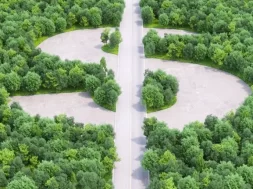
Government of India and World Bank Sign Grant Agreement to Enhance Outcomes of the Green India Mission
NEW DELHI – The Government of India, the Governments of Chhattisgarh and Madhya Pradesh, the Indian Council of Forestry Research and Education and the World Bank today signed a US$ 24.64 million grant from the Global Environment Facility (GEF) to improve forest quality, sustainable land management and benefits from Non-Timber Forest Produce for forest dependent communities in Madhya Pradesh and Chhattisgarh.
The Ecosystem Services Improvement Project will support the Government of India’s Green India Mission’s (GIM) goal of protecting, restoring and enhancing India’s forest cover and responding to climate change.
The grant agreement for the project was signed by Sameer Kumar Khare, Joint Secretary (MI), Department of Economic Affairs, Ministry of Finance, on behalf of the Government of India; Amitabh Agnihotri, Additional Principal Chief Conservator of Forests, Government of Madhya Pradesh; R B P Sinha, Additional Principal Chief Conservator of Forests, Government of Chhattisgarh; Neelu Gera, Deputy Director General, Indian Council for Forestry Research and Education; and Hisham A. Abdo Kahin, Acting Country Director and Operations Manager, World Bank, India on behalf of the World Bank.
“This project is integral to the government’s Green India Mission and will contribute to India’s Nationally Determined Contribution (NDC). It will demonstrate restoration models based on sustainable land and ecosystem management and benefit the livelihoods of the community’s dependent on the land,” said Sameer Kumar Khare, Joint Secretary (MI), Department of Economic Affairs, Ministry of Finance, Government of India.
Today forests are threatened by the changing climate. Districts in Madhya Pradesh and Chhattisgarh are part of the 39 percent forest grids that are vulnerable to climate change with the global response model (Integrated Biosphere Simulator – IBIS) predicting that nearly 73 percent of forested grids in Chhattisgarh are expected to undergo vegetation change due to climate change.
“The introduction of new tools and technologies, including use of advanced carbon measurement and monitoring system will help enhance management of natural resources, improve forest productivity, land management and income opportunities for forest-dependent communities in the two states,” said Hisham A. Abdo Kahin, Acting Country Director and World Bank’s Operations Manager in India.
The project will help improve the quality and productivity of the existing forest in about 50,000 ha. Another 25,000 ha will be used to scale up Sustainable Land and Ecosystem Management (SLEM) practices to prevent land degradation and desertification and increase above-ground forest carbon stock. This will help some 25,000 small and marginal farmers arrest the challenge of land degradation through sustainable land management.
“The project will follow the new generation landscape approach for the forestry sector to improve degraded and open forests. This approach allows a combined focus on improving forest and farm productivity, watershed treatments, control of soil erosion and integration of livelihood concerns in rural communities, said Anupam Joshi, Senior Environmental Specialist and World Bank’s Task Team Leader for this project.
The GEF Program is one of the largest and longest standing trust-funded programs in the World Bank Group. Since 1991, when the World Bank helped to establish the GEF, it has integrated global environmental benefits across the Bank programs through more than 790 investment projects and programs in 120 countries.














